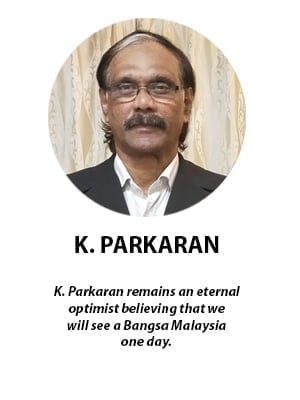FMT:
No Tamil-speaking minister, but does it matter?
A debate is raging on social media as to whether the lack of a Tamil-speaking minister will affect the Indian community.

For the first time in the history of this country, the Cabinet no longer boasts a Tamil-speaking minister.
The sole Indian minister happens to be DAP’s Gobind Singh Deo, a Punjabi who professes the Sikh faith. Prior to this, the Cabinet had always had a Tamil-speaking minister to represent the community.
Gobind replaced V Sivakumar, the sole Indian member in Prime Minister Anwar Ibrahim’s Cabinet, who was unfortunately embroiled in controversy and gave an inept performance as human resources minister.
And as if to placate the community, the number of Indian deputy ministers was increased to three, from one previously.
Yet, many argue that having three deputies does not compensate for the loss of one full-fledged minister – and social media is where the matter is being hotly debated.
Many have expressed unhappiness, but quite a number claim that nothing would change even if there were half a dozen Indian ministers in Cabinet.
For context, it must be noted that more than 90% of the Indian population in this country consists of Tamil-speaking Indians. That number includes some from other ethnic backgrounds who also speak the Tamil language.
So, does it really matter if there is no Tamil-speaking Cabinet minister?
Former DAP leader P Ramasamy thinks so. He says the lack of representation would make it impossible for Indian Tamils to defend the community’s schools, language and temples, and advance its socio-economic interests.
Some note that even Penang’s deputy chief minister II post, which Ramasamy held since its inception in 2008, was given away to a Punjabi following the last state election. In August, Jagdeep Singh Deo, Gobind’s elder brother, succeeded Ramasamy in the post.
Some say these are signs of the community being marginalised, but I beg to differ.
Over the last five decades, every administration had included at least one or two Indian ministers, and two or three deputy ministers, all of whom spoke Tamil.
Despite this, many Indian Malaysians slipped into decline as they became too dependent on the MIC leadership for survival. Of course, a small number benefited, some greatly, but the vast majority in the community were left to fend for themselves.
For 22 years, the late iron-fisted S Samy Vellu built a culture which required unflinching compliance with his edicts. When he was in power, only what he said mattered.
Cowed leaders who treated him like a demigod were the main beneficiaries of resources meant for the community. They enjoyed these as a reward for keeping him in power.
It was during this time that many started to get involved in criminal activities, with the highest percentage of gangsters coming from the community. Meanwhile, MIC leaders were overly focused on the dwindling number of Tamil schools, which they used as a platform to gain political power.
School dropout rates increased as the community was slowly displaced from plantations due to development. Many had difficulty adapting to new settings. Poverty among the Indians stood out during this period.
Disenchanted, they vented their frustrations by taking part in a huge protest led by NGO Hindu Rights Action Force, or Hindraf, in 2007. Indians in the tens of thousands converged in Kuala Lumpur to protest the government’s neglect of the community.
At the time, the Cabinet included one Tamil-speaking Cabinet minister and four deputies, all of whom were proficient in the language. So, as you can see, having more Indians in the Cabinet did not make any difference.
Prime Minister Anwar Ibrahim may have donned the kurta and danced away to Tamil songs during multiple election campaigns but that does not mean he is obliged to put his Malay image at risk by appointing more Indians to the Cabinet.
He can do so if he wants, but obviously, he needs to please the Malays and his East Malaysian counterparts more to safeguard his position.
Neither can the community expect Gobind to go out of his way to speak up for them.
During his previous stint as minister between 2018 and 2020, his government duties, which included many trips overseas, kept him busy. The plight of the community will likely remain low on his list of his priorities this time around.
And how much can we expect from the three deputy ministers – M Kula Segaran, R Ramanan and K Saraswathy – in terms of lifting the community out of the doldrums? Are they the ones who will buck a decades-long trend and revive the community’s fortunes?
I, for one, am not holding my breath.
Indian Malaysians should take a leaf from the many successful men and women who have emerged from the community and fight the odds through sheer hard work and discipline to make better lives for themselves.
They should not be deluded into thinking that having more Indian leaders in Cabinet will improve the lot of their community.
Rather, they should seek to emulate the Chinese community, which did not depend on MCA to build their businesses. Neither did they rely on their community’s representation in government to protect their interests.
Their progress has been through sheer hard work, the pursuit of academic excellence and the use of their business acumen.
It is time for Indian Malaysians to do the same.
No comments:
Post a Comment